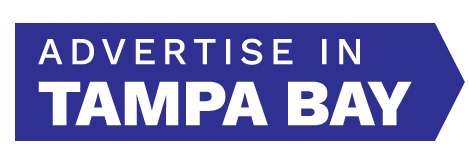Every month, 3.2 million adults in Tampa Bay use social media, according to Nielsen. Seventy-five percent of these consumers use Facebook, far more than other sites like Instagram (also owned by Facebook), Twitter, Snapchat, Pinterest, and LinkedIn.
As a stand-alone medium, Facebook is used by more people in Tampa Bay than watch local TV stations. Only Tampa Bay radio and local cable reach more consumers.
The large audience commanded by social media has attracted a significant amount of advertising dollars from local advertisers. According to Borrell Associates, a company that measures advertising expenditures across the county, Tampa Bay area businesses are expected to spend $311 million on social media advertising, a 29.9% increase over 2022. The overwhelming majority of these dollars are being spent with Facebook.
Yesterday, Facebook founder Mark Zuckerberg announced the company was changing its name to "Meta". This change, though, only affects the name of the parent company. There will be no change to the company's brands like Facebook, Instagram, or WhatsApp.
How will this name change affect Tampa Bay businesses that advertise on Facebook?
Read More
Topics
tampa radio,
facebook advertising,
instagram,
facebook,
twitter,
social media advertising,
borrell associates,
social media,
LinkedIn,
metaverse,
meta
Attention Tampa Bay small business owners and retailers: nearly half of holiday shoppers are already spending money. According to the National Retail Federation, 49% of consumers will start their Christmas season shopping before Hallowe'en.
Consumers plan to spend $997.73 on gifts, holiday items, and other non-gift purchases for themselves and their families this year, according to the annual survey released today by the NRF and Prosper Insights & Analytics.
In all, based on forecasts from Deloitte, the world's largest accounting firm, Tampa Bay consumers are expected to spend between $12.9 and $13.2 billion during the holiday shopping period. This would be a 7-9% increase over 2020.
"We anticipate strong consumer spending for the upcoming holiday season. As vaccination rates rise and consumers are more comfortable being outside of the home, we are likely to see increased spending on services, including restaurants and travel, while spending on goods will continue to hold steady. A steady decline in the savings rate to pre-pandemic levels will support consumer spending and keep retail sales elevated this season," said Daniel Bachman, Deloitte's U.S. economic forecaster. "Further, e-commerce sales will continue to grow as consumers demonstrate an ongoing and steady movement toward buying online across all categories."
Tampa Bay retailers are noticing that the opening bell for holiday shopping has rung earlier than ever for local shoppers.
Read More
Topics
Return On Investment,
ROI,
small business,
small business owner,
tampa small business owners,
retail stores,
small business advertising,
holiday,
holiday shopping,
christmas shopping,
millennial parents,
children,
Retail Sales,
Retailer,
retail,
small business marketing,
holiday advertising,
parents,
retail spending,
advertising return on investment,
shopping
Tampa Bay consumers are on track to spend more than $46.3 billion at retail this year, based on projections by the National Retail Federation (NRF). Spending is expected to be 13.5% higher than last year.
Some Tampa Bay small business owners, though, are wondering if the spread of the Delta Variant may slow spending if consumers sense pressure on their own financial security. Shoppers, however, don't see it that way.
New research from Nielsen indicates that 82% of consumers believe their household finances will either remain the same or improve during the upcoming months.
The Nielsen study has another finding that Tampa Bay business owners will find promising. Consumers are more likely to shop locally than they did before the onset of the pandemic, although in different ways.
Read More
Topics
Return On Investment,
ROI,
best way to advertise,
retail stores,
consumer spending,
Retail Sales,
Retailer,
retail,
advertising on radio,
retail spending,
advertising return on investment,
shopping
According to Nielsen, 566,261 Tampa Bay consumers listened to or downloaded a podcast during the past 30 days. This is 21.8% of the adult population.
A podcast is a downloadable digital audio file available to listeners on an internet-connected device like a smartphone, tablet, or computer. These files are typically part of series focusing on a particular theme such as true crime, professional football, politics, or pop culture.
Tampa Bay consumers can listen to their favorite podcasts whenever they choose using apps like Spotify, Pandora, Google, and Stitcher. The most used podcasting app, though, is Apple Podcasts.
Research from PodcastHosing.org indicates that Tampa Bay consumers can access more than 2,000,000 podcast series comprising over 48,000,000 unique episodes. According to data compiled by Edison research, the top 10 podcasts during the second quarter of 2021 were:
Read More
Topics
Streaming,
Streaming Audio,
best way to advertise,
tampa radio,
digital advertising,
online advertising,
smart speaker,
podcasts,
tampa bay radio,
internet advertising,
podcasting
Since 1922 when WDAE-AM signed on, local small business owners have been advertising on Tampa Bay radio to market the goods and services they sell.
Lately, some of these advertisers are voicing concerns, though, that the accelerating use of smart speakers could erode the effectiveness of commercials on local stations. Current research, however, reveals that these devices actually extend the reach of the medium and its ad content.
More than 727,000 consumers in Tampa Bay have a smart speaker in their homes, according to Nielsen. This is 28% of the local adult population.
Smart speakers are internet-enabled devices controlled by spoken commands and capable of streaming audio content, relaying information, and communicating with other devices.
According to the Cooperative Institutional Research Program (CIRP) data, Amazon Echo (aka Alexa) accounts for 69% of all smart speakers in use. Google's smart speaker makes up another 20% of the market. The remaining 11% of the market comprises Apple Home (aka Siri), Sonos, and Bose.
Tampa Bay consumers can use their smart speakers to accomplish a diverse range of tasks, including accessing news, weather, and sports information; turning on lights in the house; shopping; and food delivery.
The most common use of a smart speaker, though, is streaming audio, including Tampa Bay radio stations, according to eMarketer. Edison Research's Share of Ear Study indicates that consumers devote 13% of their total time using a smart speaker listening to AM/FM radio stations. This is second only to the time spent listening to Amazon Music at 19%.
Read More
Topics
small business,
small business owner,
Streaming,
Streaming Audio,
radio advertising,
tampa small business owners,
digital advertising,
online advertising,
how to advertise,
small business advertising,
radio listeners,
effective advertising,
amazon echo,
smart speaker,
google home,
small business marketing,
siri,
internet advertising,
alexa
Tampa Bay business owners who sell goods and services related to Halloween can expect far more treat than trick this year.
Based on estimates from The National Retail Federation (NRF), Tampa Bay consumers are expected to spend a record $102,960,877 on Halloween. This would be 19.3% more than was handed out in 2020.
The NRF estimates that 65% of consumers intend to celebrate Halloween or participate in Halloween activities this year, up from 58% in 2020 and comparable with 68% in 2019 before the COVID-19 pandemic.
The top ways consumers are planning to celebrate include handing out candy (66%), decorating their home or yard (52%), dressing in costumes (46%), carving a pumpkin (44%), and hosting or attending a party (25%).
Tampa Bay small business owners looking to scare up a share of this Halloween cash will need to advertise to drive local consumers to their stores and websites. But, to make a difference, advertising needs to begin right away.
"This year consumers are shopping for Halloween items earlier than ever," says the NRF, "with 45% planning to shop in September or earlier and another 39% during the first two weeks of October."
Read More
Topics
Return On Investment,
ROI,
best way to advertise,
radio advertising,
retail stores,
halloween,
pet owners,
pet marketing,
children,
Retail Sales,
Retailer,
retail,
retail spending,
advertising return on investment
Tampa Bay business owners are expected to spend $257,507,00 on streaming video advertising in 2021, according to Borrell Associates, a company that tracks online marketing expenditures across the country. This spending will be 25.9% higher than in 2020.
Streaming video advertising expenditures are accelerating as Tampa Bay consumers continue to abandon shows on local TV stations and cable systems in favor of programming streamed via an internet connection. These online channels include Netflix, Hulu, Prime, Disney+, Paramount+, Peacock, Prime Video, Roku Channel, SlingTV, PlutoTV, and dozens more.
This type of streamed video content is known collectively as OTT (Over-The-Top-Television) or CTV (Connected-Television). These two terms are sometimes used interchangeably but do have a subtle difference.
OTT generally means the video is watched on a small device like a computer, tablet, or smartphone. CTV, on the other hand, typically means the content is viewed on a smart-TV or a regular television using a streaming device like a Roku or Amazon stick.
In Tampa Bay, according to Nielsen, OTT/CTV has exceeded the weekly reach of local newspapers and streaming audio services such as Pandora and Spotify. The medium is rapidly approaching the reach of local cable and broadcast TV stations.
Read More
Topics
Cable TV,
Television Advertising,
Streaming,
Streaming Audio,
digital advertising,
online advertising,
OTT,
CTV,
streaming video,
local television,
streaming television,
internet advertising
According to the US Census Bureau, there are 138,637 businesses in the Tampa Bay area. Some of these companies are small. Some are large. Some sell machine parts. Some sell software. Some provide legal services. Some provide eyecare.
Regardless of the size of the business or what it sells, all of these local companies have one thing in common: they are struggling to fill open jobs with qualified candidates. This is true in Tampa Bay as well as Clearwater, St. Petersburg, Lakeland, Brandon, and every point in between.
Right now, across the country, according to the Bureau of Labor Statistics, there are 10.9 million open jobs. This is an all-time record.
To put this mammoth number of open jobs in perspective, the Federal Reserve says there are now five job openings per every four unemployed people.
Attempting to recruit Tampa Bay workers from the ranks of the unemployed has proven fruitless for local companies. This is because many people who lost their jobs during the pandemic have no intention of returning to the workforce anytime soon.
There are several reasons so many Tampa Bay workers are not coming back.
First, older workers have opted to retire earlier than expected. Second, childcare issues are making it necessary for some parents to stay home. Third, other workers cite health safety issues for the reason why they chose not to work. Finally, some of the unemployed are choosing to live off the savings they amassed during the pandemic.
So rather than focusing recruitment efforts among former employees and the ranks of the unemployed, local business owners need to target the 1.2 million passive job seekers in Tampa Bay.
Read More
Topics
best way to advertise,
radio advertising,
recruitment advertising,
white collar workers,
blue collar,
employment advertising,
indeed,
zip recruiter
If you were one of the 2.2 million adults who tuned in to Tampa radio last week, then chances are excellent that you heard advertising for ZipRecruiter. That's because the company purchased 1,436 advertisements to air on local stations during the month of August, according to Media Monitors.
ZipRecruiter is an online recruitment site that helps companies of every size advertise open jobs. Overall, more than 2.8 million companies have posted an opening on ZipRecruiter.com
It is no wonder that ZipRecruiter and its competitors like Indeed have been making significant advertising investments on Tampa radio. Finding qualified workers is one of the toughest challenges facing local business owners. According to the Bureau of Labor Statistics, the number of job openings in the U.S. has reached a record high 10.1-million jobs with just not enough candidates to fill them.
If you've heard these commercials on Tampa radio, then you know that ZipRecruiter is not advertising to attract job seekers to its website. Rather, the company's goal is to convince local business owners to buy help wanted ads from them.
So, why has ZipRecruiter chosen Tampa radio as a business-to-business (B2B) advertising resource? The first reason is revealed in the first line of their commercial.
"According to research," says the announcer, "82% of people remember radio ads."
Read More
Topics
small business,
small business owner,
best way to advertise,
radio advertising,
tampa small business owners,
recruitment advertising,
radio recruitment advertising,
small business advertising,
small business marketing,
b2b,
business to business,
indeed,
zip recruiter,
advertising options
When Tampa Bay's first radio station, WDAE, began broadcasting on May 31, 1922, the station needed a tall antenna and lots of buried copper cable to transmit its signal. Radio receivers at the time were mostly homemade and involved a piece of crystalline mineral and a wire coil.
Over many decades in Tampa Bay, both the broadcasting and receiving equipment improved. In the mid-1920s this meant store-bought radios. In the 1930s this meant car radios. In the 1960s this meant transistor radios. In the 1970s this meant boom boxes. And, in the 1980s this meant Walkmen. But, despite these improvements, the fundamental technology of big towers sending a signal through the air to a radio receiver remained the same.
In 1994, there was a new way for Tampa Bay consumers to listen to the radio. That was the year local stations across the country began streaming their signals over the internet and listeners could use their computers (later their smartphones and smart speakers) as receiving devices. No big antennas, no wires, and no actual radio needed.
In 2021, according to Nielsen, Tampa radio reaches more local consumers than any other advertising media option.
Neilsen finds, too, that 34.8% of all consumers who listen to a Tampa Bay radio station over-the-air will, at some point during the month, also connect to a local station via the internet.
Read More
Topics
Streaming,
Streaming Audio,
best way to advertise,
radio advertising,
online advertising,
smart speaker,
internet,
advertising options













